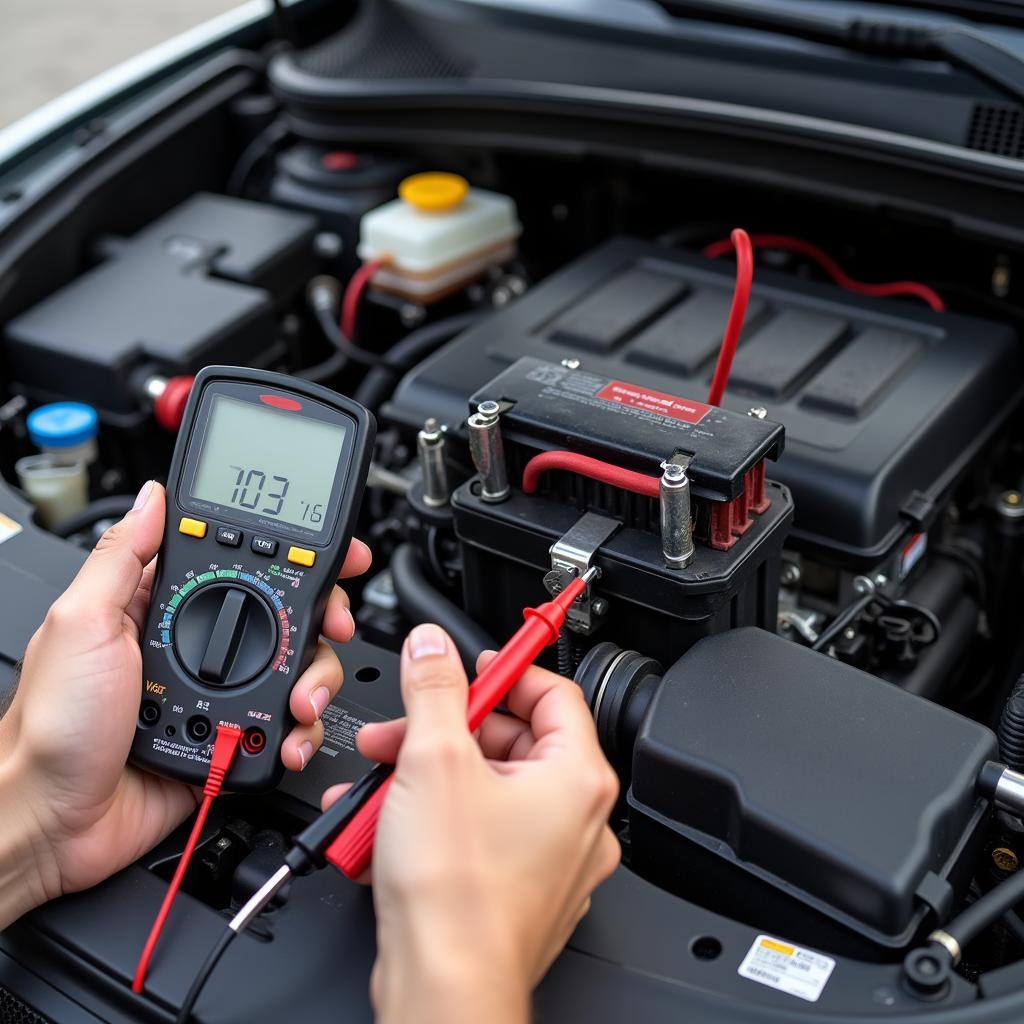Experiencing problems with your car not starting can be incredibly frustrating, especially when you’re in a hurry. Understanding the potential causes and knowing some basic troubleshooting steps can save you time, money, and a lot of headaches.  Checking car battery with multimeter when car won’t start This article will guide you through the most common reasons for car starting problems and provide practical solutions you can try yourself.
Checking car battery with multimeter when car won’t start This article will guide you through the most common reasons for car starting problems and provide practical solutions you can try yourself.
Common Culprits Behind Car Starting Issues
Several factors can contribute to Problems With Car Not Starting. From a simple dead battery to more complex issues with the starter or fuel system, pinpointing the source of the trouble is the first step toward getting your car back on the road.
Battery Blues: The Most Frequent Offender
The most common reason for a car not starting is a dead or weak battery. Over time, batteries lose their ability to hold a charge, especially in extreme temperatures. You might hear a clicking sound when you turn the key, or the lights might be dim. A simple jump-start can often get you going, but if the battery is old, it’s likely time for a replacement. What are other signs of a failing battery? Look for slow cranking, flickering headlights, and even a swollen battery case.
Starter Struggles: When the Engine Won’t Crank
If your car is completely silent when you turn the key, the starter motor might be the issue. This component is responsible for cranking the engine, and if it fails, nothing happens. A bad starter can sometimes produce a grinding noise. Testing the starter often requires some mechanical know-how, so it’s best to consult a mechanic if you suspect this is the problem.
Fuel System Failures: From Empty Tank to Clogged Injectors
A car needs fuel to run, so problems with the fuel system can also prevent it from starting. An empty fuel tank is the most obvious culprit, but other issues can include a clogged fuel filter, a faulty fuel pump, or malfunctioning fuel injectors. If you suspect a fuel problem, listen for the fuel pump when you turn the key to the “on” position. You should hear a quiet whirring sound.
Ignition System Issues: Spark Plug Troubles and More
The ignition system is responsible for creating the spark that ignites the fuel-air mixture in the engine. Worn-out spark plugs, faulty ignition coils, or problems with the distributor (in older cars) can prevent the engine from starting. If you smell gasoline when trying to start the car, it could indicate a flooded engine due to an ignition problem.
Troubleshooting Tips for a Car That Won’t Start
Before you call a tow truck, here are some simple things you can try:
- Check the Battery: Try jump-starting the car. If it starts, the battery is likely the problem.
- Inspect the Starter: Listen for any unusual noises when turning the key. A clicking or grinding sound could point to a starter issue.
- Check the Fuel Gauge: Make sure you have enough fuel. It sounds obvious, but it happens!
- Examine the Spark Plugs: If you’re comfortable doing so, remove a spark plug and check its condition. A worn-out spark plug will have a blackened or corroded tip.
“A simple check of your battery connections can often solve starting problems. Make sure they’re clean and tight,” advises John Smith, a certified automotive technician with over 20 years of experience. “Don’t underestimate the importance of regular maintenance. It can prevent many starting issues before they occur.”
Problems with Car Not Starting: Getting Back on the Road
Dealing with problems with car not starting can be a hassle, but with a little knowledge and troubleshooting, you can often identify the cause and get your car running again. Remember to check the battery, starter, fuel system, and ignition system for potential issues.
“Regularly checking your car’s fluids and ensuring your battery terminals are clean can prevent a lot of starting problems,” adds Jane Doe, a seasoned mechanic and automotive instructor. “It’s like brushing your teeth for your car – a little preventive care goes a long way!”
If you’re still struggling with starting problems, don’t hesitate to contact a qualified mechanic for assistance. For expert advice and reliable service, reach out to AutoTipPro at +1 (641) 206-8880. Our office is located at 500 N St Mary’s St, San Antonio, TX 78205, United States. We are always ready to help you get back on the road.
FAQ
- What is the most common reason for a car not starting? A dead battery is often the culprit.
- What does a clicking sound when turning the key indicate? It usually suggests a weak battery or a starter problem.
- Why does my car smell like gas when I try to start it? This could be a sign of a flooded engine, often related to the ignition system.
- How can I test my car battery? You can use a multimeter to check the battery voltage or try jump-starting the car.
- What should I do if my car won’t start and I’ve tried everything? Call a qualified mechanic or a towing service for assistance.
- Can extreme temperatures affect my car’s ability to start? Yes, both extreme heat and cold can impact battery performance and other engine components.
- How can I prevent problems with car not starting? Regular maintenance, including battery checks, fluid top-offs, and inspections, can help prevent many starting issues.





Leave a Reply